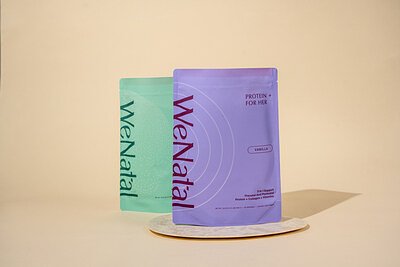
Beyond Prenatal Vitamins: New Brand Targets Comprehensive Nutrition for Both Partners
WeNatal is challenging the status quo in prenatal care with a 3-in-1 protein powder and a focus on meeting the nutritional needs of both parents on the fertility journey – and rigorous testing for safety.
Beyond Prenatal Vitamins: New Brand Targets Comprehensive Nutrition for Both Partners
By Charles Anderson
Los Angeles, CA – In a market saturated with prenatal vitamins, a new brand, WeNatal, is aiming to redefine prenatal and fertility nutrition with a comprehensive approach that extends beyond basic supplementation. The company’s flagship product, a 3-in-1 protein powder designed for both men and women, addresses a growing demand for more holistic, evidence-based support throughout the entire fertility and pregnancy journey. But beyond the novel formulation, WeNatal is also making waves with its commitment to transparency and rigorous testing, particularly regarding heavy metal safety – a concern gaining traction among health-conscious consumers.
Founded by former Nike executives, WeNatal emerged from a personal experience with pregnancy loss. The founders, seeking better guidance and a more comprehensive nutritional approach, identified a significant gap in the market. Their mission: to shift the focus from solely maternal health to a more inclusive, partnership-driven approach to fertility and prenatal care.
“We felt dismissed and unsupported during our own fertility journeys,” one founder shared anonymously. “We realized that both partners play a vital role, and both need targeted nutritional support. We wanted to create a brand that acknowledged that and provided solutions.”
A Holistic Approach to Prenatal Nutrition
WeNatal's protein powder isn’t positioned as a replacement for prenatal vitamins, but rather as a complementary boost. Each serving delivers 20 grams of protein sourced from grass-fed whey and collagen, alongside a full spectrum of vitamins and minerals. The formulation targets not only the increased protein needs during pregnancy but also the general nutritional gaps that many couples face during preconception and throughout pregnancy and postpartum.
According to recent research, current protein recommendations for pregnant women may be significantly underestimated. Studies using the indicator amino acid oxidation (IAAO) method suggest that the Recommended Dietary Allowance (RDA) of 60g/day may be insufficient, with some women needing upwards of 100g/day, particularly during late gestation. This supports WeNatal’s focus on providing a substantial protein boost to support fetal development, placental growth, and postpartum recovery.
However, what truly sets WeNatal apart is its targeted approach for both partners. Traditional prenatal nutrition largely focuses solely on the mother-to-be. WeNatal recognizes that male fertility and overall health are equally important for conception and a healthy pregnancy. By providing a formulation designed for both, the brand aims to optimize the nutritional landscape for the entire couple.
Addressing the Heavy Metal Concern
The supplement industry has faced increased scrutiny regarding heavy metal contamination in recent years. Independent testing has revealed that some plant-based protein powders contain levels of lead, cadmium, arsenic, and mercury that exceed safety limits. This has raised concerns among consumers and prompted calls for stricter regulation.
WeNatal is proactively addressing these concerns by prioritizing third-party testing and verification against California’s Proposition 65 standards (Prop 65), which sets strict limits for exposure to certain chemicals, including heavy metals. The company says it goes beyond basic testing, ensuring its products meet the highest safety standards.
“We understand the concerns surrounding heavy metals in supplements,” another founder shared anonymously. “We’re committed to transparency and rigorous testing. We believe consumers deserve to know what’s in their products and that they’re safe.”
The company’s commitment extends to not just testing for contaminants, but also sourcing high-quality ingredients and implementing stringent manufacturing processes to minimize the risk of contamination. WeNatal’s products are also kosher-certified, a further indication of its commitment to quality and adherence to strict standards.
A Growing Market for Comprehensive Solutions
The global prenatal nutrition market is booming, driven by increasing awareness of maternal health and the growing demand for targeted supplementation. The market is projected to reach over $2.2 billion by 2025, with a Compound Annual Growth Rate (CAGR) of over 8%. The fertility supplements market is also experiencing significant growth, with a projected CAGR of over 6.8%.
Analysts predict that the demand for more comprehensive, holistic solutions will continue to rise as consumers become more informed and proactive about their health. This creates a significant opportunity for brands like WeNatal that prioritize quality, transparency, and targeted nutrition.
“Consumers are no longer satisfied with just a basic prenatal vitamin,” explains a nutritional science consultant who wished to remain anonymous. “They’re looking for solutions that address their individual needs and support their overall health. Brands that can offer that will be well-positioned for success.”
Looking Ahead
WeNatal’s launch represents a shift in the landscape of prenatal and fertility nutrition. By prioritizing comprehensive support for both partners and addressing key concerns about safety and quality, the brand is challenging the status quo and paving the way for a more holistic and informed approach to reproductive health. The company plans to expand its product line to include additional supplements and resources designed to support couples throughout their fertility and pregnancy journeys. As the market continues to evolve, WeNatal is poised to become a leader in the growing field of comprehensive reproductive wellness.
